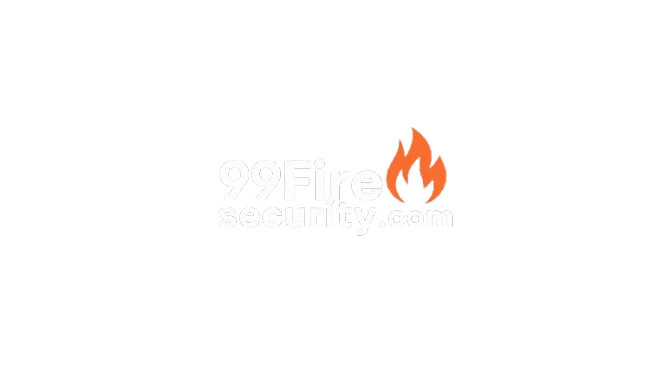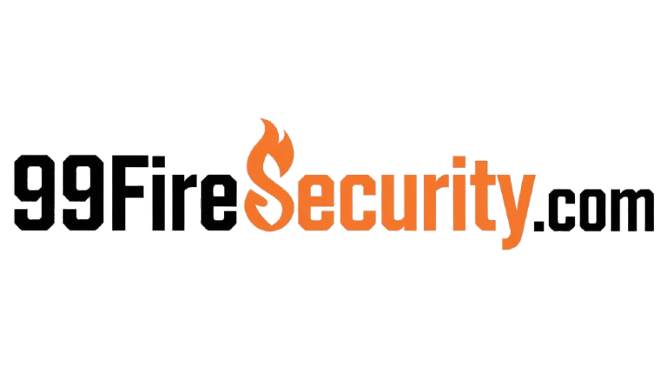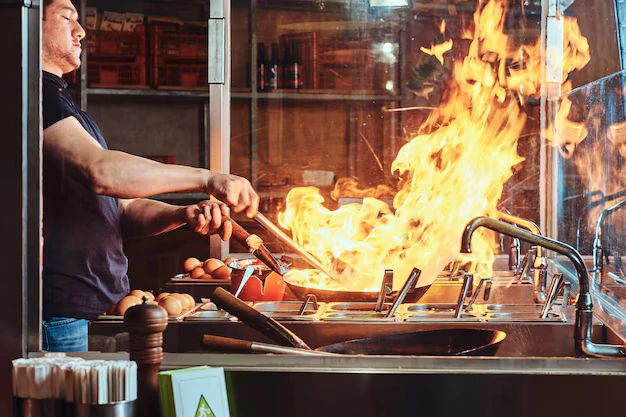Commercial kitchens are busy places, frequently involving high heat, open flames, and complicated cooking equipment. Together these create a high fire risk. According to the National Fire Protection Association (NFPA), cooking equipment causes nearly 60% of all fires in commercial buildings. This is why complying with fire safety laws and showcasing best practices is crucial to keeping your team and customers safe.
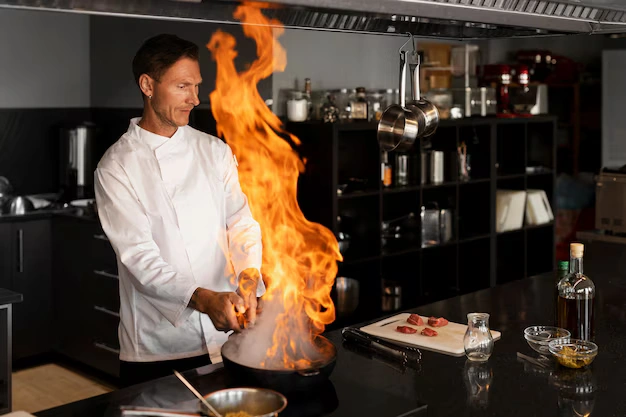
In this article, we outline what to know about fire safety compliance so your commercial kitchen can stay safe, operational, and capable of complying with the law.
Ensure proper ventilation and hood systems.
Kitchen exhaust systems & hoods are used to remove smoke, grease, and heat from cooking equipment. These systems prevent the accumulation of flammable material and fires. Fire safety relies heavily upon the routine cleaning and maintenance of exhaust hoods and ventilation systems.
Best Practices:
- Have grease filters and ducts cleaned routinely to prevent grease buildup, a top cause of kitchen fires.
- Hoods and vents in commercial kitchens should be appropriately sized for cooking equipment.
- Install and service automatic wet chemical systems that suppress fires in cooking areas and prevent the spread of fires by quickly extinguishing any fire that does occur.
Maintain and Test Fire Suppression Systems
Fire suppression systems are automated systems that extinguish flames in the event of a fire. They are essential kitchen fire safety devices, and especially for areas of the home that utilize high-heat cooking techniques like deep frying or grilling.
Best Practices:
- Regular inspections and testing of fire suppression systems.
- All kitchen staff should know how the fire suppression system works as well as how to trigger it in a manual state if the system is activated without a pull.
- Do not allow any oscillation in the data about you because of a compliance act, maybe by electrical safety or some other safety compliance act.
Train Kitchen Staff on Fire Safety Procedures
Fire safety training for kitchen staff is essential. Employees must receive training regarding common fire hazards & how to prevent and respond to fires should they occur. Regular training minimizes the risk of fire and prepares your team for a riskless environment.
Best Practices:
- Fire drill and safety training should be performed periodically (at least quarterly) to make sure that employees know what the fire escape route is and where the fire extinguishers are located.
- Educate staff on how to properly use fire extinguishers and when to do so, emphasizing that speed is essential during a fire emergency.
- Regularly review emergency procedures with staff, particularly when new staff join the team.
Inspect and Maintain Cooking Equipment
Cooking equipment that has been poorly maintained or is malfunctioning can be a major fire hazard. Check all equipment regularly for safety, and repair or replace malfunctioning equipment.
Best Practices:
- Regularly inspect cooking equipment (fryers, grills, ovens, stoves, etc.).
- Other things you should do are replace worn-out or damaged equipment that could malfunction and cause a fire, like frayed power cords or busted burners.
- Inspect and maintain all equipment according to manufacturer instructions.
Inspect and maintain all equipment according to manufacturer instructions.
Flammable materials such as cooking oils, cleaning agents, and paper towels may lead to fires in commercial kitchens. Proper storage of these materials, along with careful handling, is key to preventing fires.
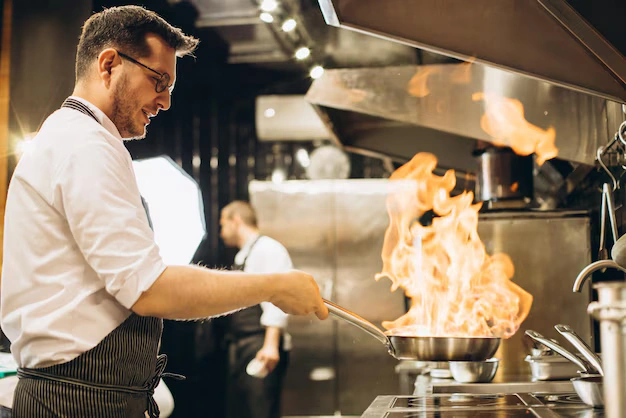
Best Practices:
- Store flammable materials away from heat and cooking equipment.
- Store oils in approved containers that are labeled appropriately.
- Safely and in accordance with local laws, dispose of any waste products, such as oily rags. Make sure trash containers are emptied regularly and stored away from heat sources.
Install and Maintain Fire Extinguishers
Fire Hose Reel: Used to put out fires. Proper Type/Location of Extinguisher There are various types of fire extinguishers. The kitchen is among the most fire-prone areas in a public or commercial space, and therefore, different types of fire extinguishers may be needed based on the hazards.
Best Practices:
- For grease fires in cooking areas, install Class K fire extinguishers.
- Keep fire extinguishers handy and have them serviced regularly.
- Train staff to use the fire extinguishers correctly, including knowing what kind of extinguisher should be used for various types of fires.
Follow local fire safety codes and regulations.
Every commercial kitchen must comply with the local fire safety codes, and this is non-negotiable. (These codes will be case-by-case and meant to mitigate fire hazards, as well as keep operations safe.) Failure to comply could result in penalties, fines, or even the shutting down of the kitchen.
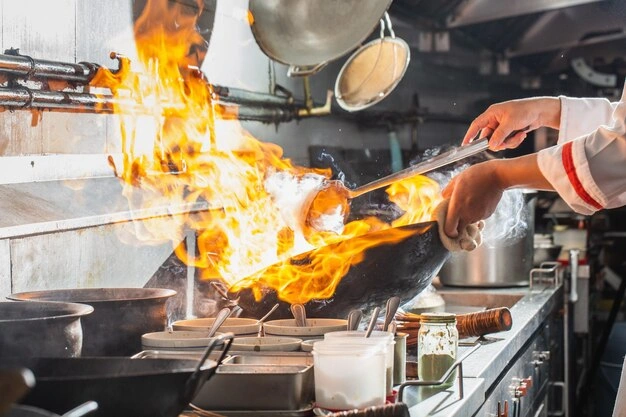
Best Practices:
- Be aware of local fire safety codes and regulations associated with commercial kitchens.
- Partner with local fire departments or safety experts to ensure your kitchen meets all necessary requirements.
- Stay informed regarding fire safety regulation updates, and ensure that your operations are modified accordingly.
Conclusion
Therefore, the fire safety compliance in your commercial kitchen prevents risks to your staff, customers, and business. When you commit to following best practices for your restaurant, such as proper ventilation systems, fire suppression systems testing, staff training, and cooking equipment inspection, your potential for fire hazards can be greatly minimized. Following these tips will not only keep your kitchen safe but also help you maintain compliance with local fire safety laws. With a few precautions, your kitchen will be a much safer place for all parties involved.
FAQs
Is a fire suppression system required in my kitchen?
Yes, you have to have a fire suppression system in kitchens that have cooking equipment such as fryers, grills, and stoves. These systems must have automatically activated in fire for safety.
Can I use a normal fire extinguisher in the kitchen?
No, Class K fire extinguishers are meant for commercial kitchens and are for grease fires. Make sure you get the right type of extinguisher for the fires you have.
How frequently should kitchen team members be trained in fire safety?
Annual fire safety training should be provided with regular drills and refresher content for new or seasonal employees.
What to Do in Case of a Fire in My Commercial Kitchen?
In case of fire, immediately activate the fire suppression system if available, call the fire department, and use an extinguisher if it is safe to do so. Evacuate if you need to.
